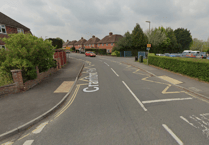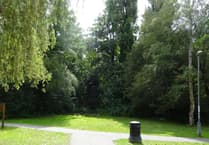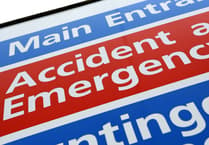Hundreds of pubs have vanished from our towns and villages in the past decade or so. The huge numbers disappearing may be a modern phenomenon, but the closure of inns and taverns is nothing new.
This week in Pubs of the Past, we look at a Farnham watering hole that ceased to exist before living memory but has an interesting history – one touched by tragedy and criminality.
The Baker’s Arms that once stood in Upper Church Lane was a lodging house as well as a pub, and crops up several times in the records as a haunt for a cast of disreputable characters.
One of the landlords, Edward Pointer, was fined ten shillings for using deficient measures in 1882, while another licensee, Henry Chitty, was fined 12 shillings for refusing to admit a police constable to his premises.
His wife finally answered the late-night call for him.
Why the police were calling at the establishment on that occasion is unclear, but it seems to have been a place “well known” to them.
Some of the offences committed by lodgers at the pub included theft and burglary.
A 47-year-old painter, Arthur Marlow, was found guilty of stealing valuables including silver bangles and rings from a house in Fleet in January 1902.
As part of his defence, he called Albert Smith, the landlord of the Baker’s Arms, who gave evidence that Marlow was in bed at the pub on the night of the burglary.
But the judge scoffed at the suggestion the accused had spent 14 hours sleeping and, besides, some of the property was found under his pillow at another lodging house where he later stayed. Marlow, who had a long list of previous convictions, was sentenced to three years’ penal servitude.
Another light-fingered lodger at the Baker’s Arms was Ellen Smith, who in 1891 made off with a skirt, bodice and pair of stockings belonging to fellow lodger Annie Sheppard. Smith went to prison for one month after failing to pay a 42 shilling fine.
Most of those who lodged at the pub would have been honest, working people, but court reports reveal it was also frequented by thieves trying to sell their stolen goods. In 1905, hawker John Smith pleaded guilty to stealing a sunshade from Hale House and offering it for sale at the Baker’s Arms.
Labourer Thomas Abbott, 31, burgled the Red Lion pub in Aldershot, taking two coats, a vest, a knife and a bottle of rum, among other things, and the next day sold handkerchiefs from the swag to the Baker’s Arms landlady.
For this he earned 18 months’ prison with hard labour in 1868.
Most of the petty crimes committed reek of poverty and desperation.
In 1894, John Grigg accused his wife Susan of stealing £1 17s from their home in Brook Street, Basingstoke, and running away with it. Several months later she turned out to be lodging at – the Baker’s Arms. The case was dismissed for lack of evidence.
Why she felt it necessary to leave her husband and two children in the first place, we can only guess.
One of the saddest events associated with the pub was the death of a four-year-old boy in 1868. William Bailey Pomeroy, the son of the-then landlord, was found dead in bed. After hearing medical evidence, an inquest jury decided he died of natural causes, a result of convulsive fits.
The Baker’s Arms was by no means the only pub in the Farnham area to have brushes with the law and appears to have been generally well run, despite having at least four changes of licensee in as many decades.
The pub narrowly avoided being closed down in 1903 when magistrates refused to renew its licence, but the decision was overturned on appeal.
The superintendent’s report to the general annual licensing meeting in February stated the Baker’s Arms had ceased to be a ‘common lodging house’, the implication being this was a good thing. The pub survived for another six years.
But the reprieve couldn’t last forever and in 1909 the Baker’s Arms was among four Farnham pubs to lose their licence, the others being the White Lion, the Goat’s Head and the Green Man.
Today the building that was once a favoured refuge of rogues and paupers is a private house.




